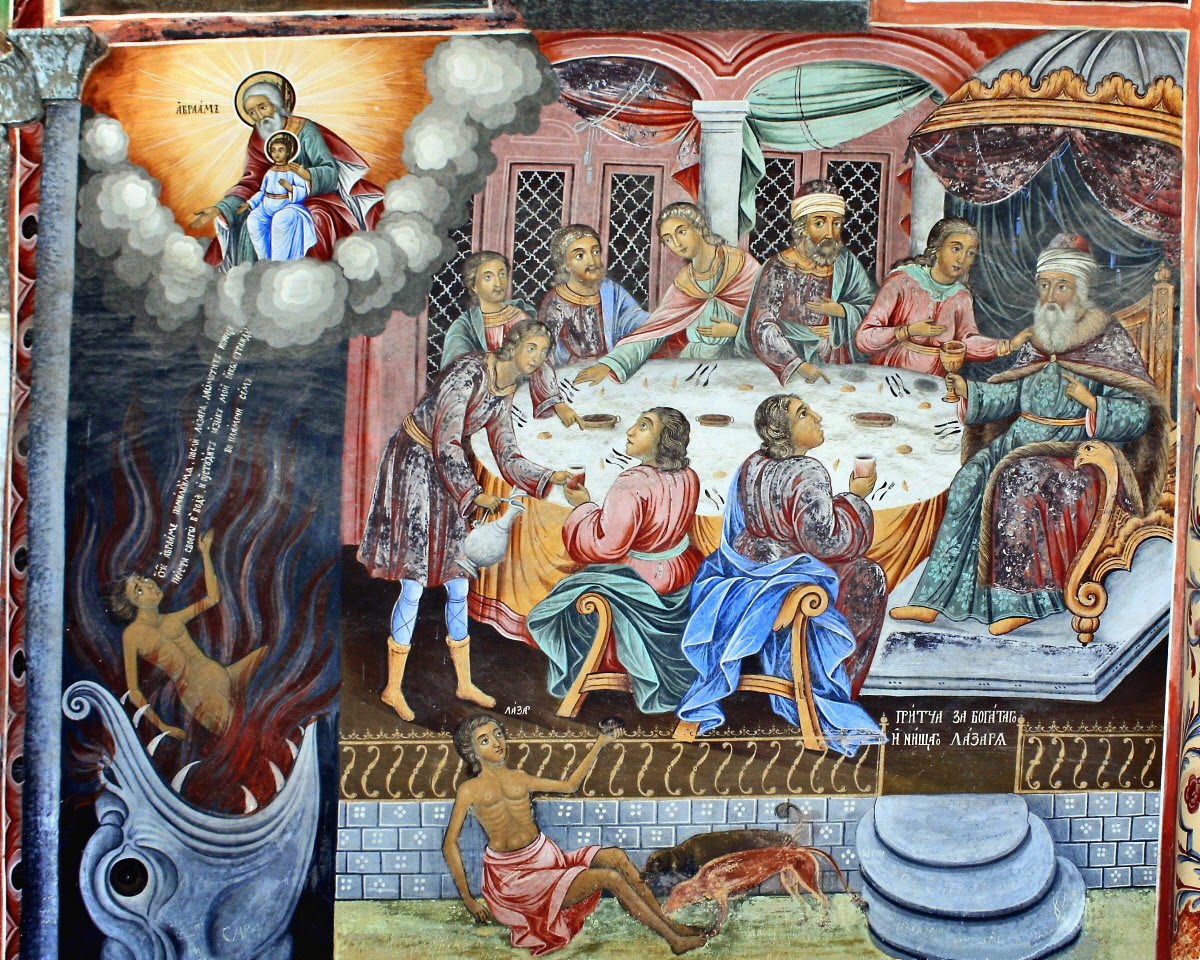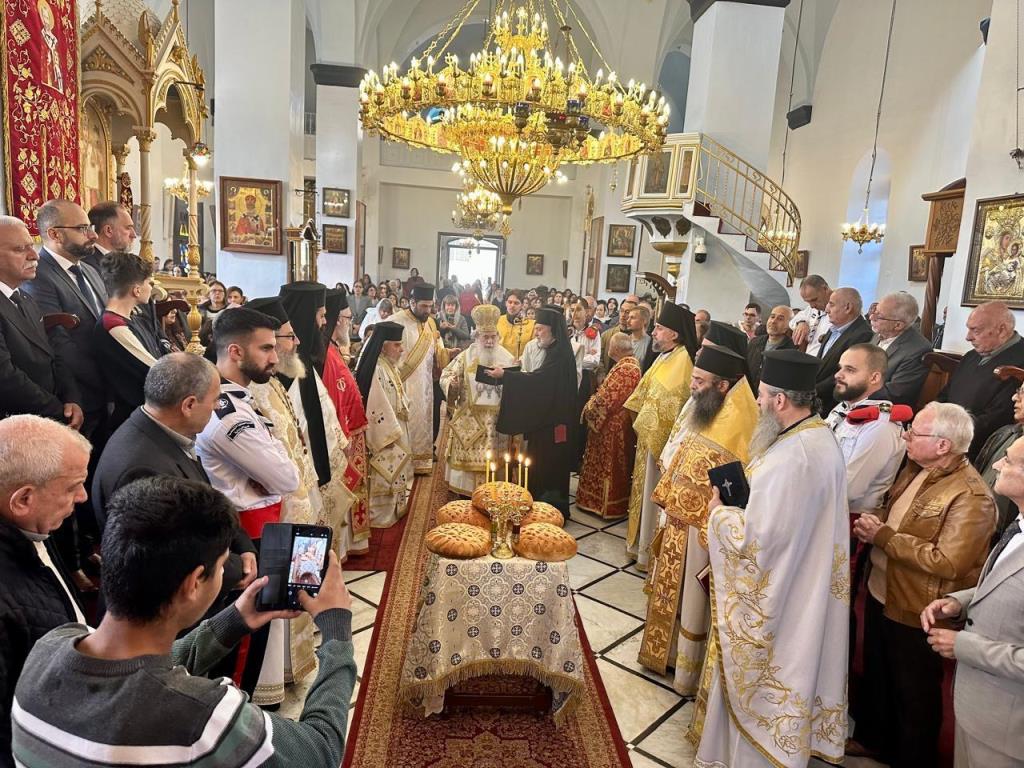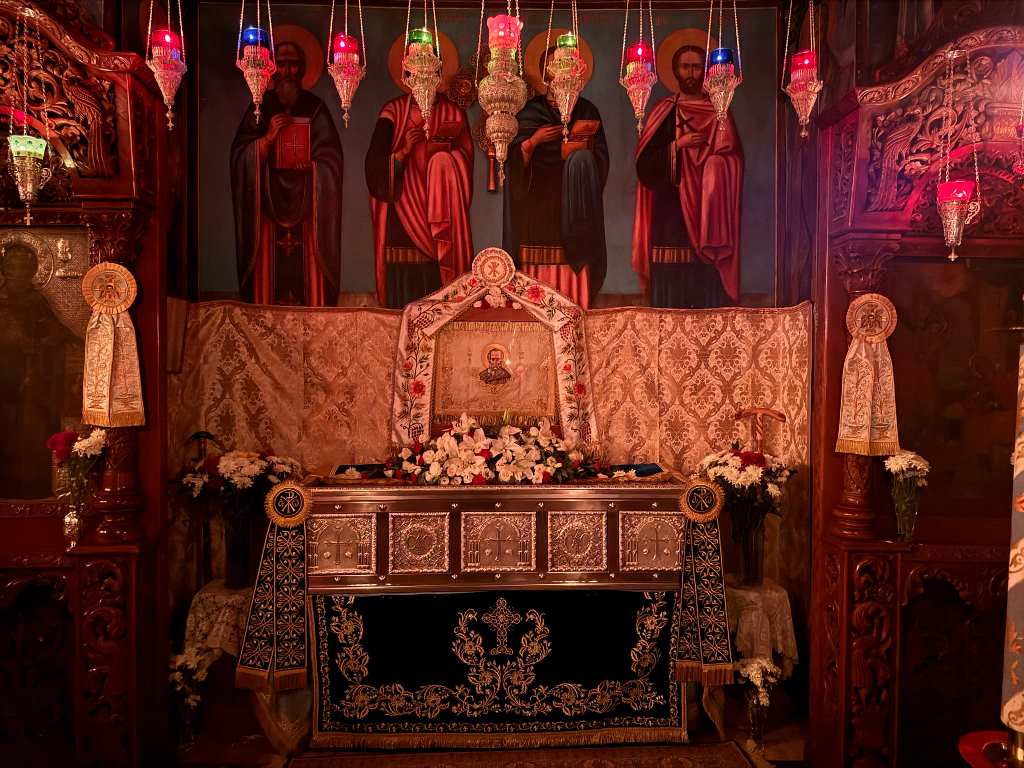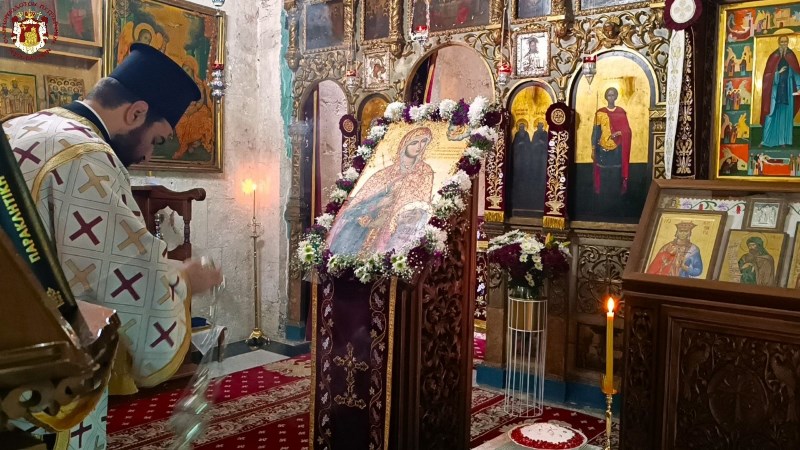The Rich Man and Lazarus


Gospel Reading for the 5th Sunday of Luke
From the Kyriakodromion of Monk Agapios, 17th century*.
The Lord said, ‘There was a rich man, who was clothed in purple and fine linen and who feasted sumptuously every day. And at his gate lay a poor man named Lazarus, covered in sores, who desired to be fed with what fell from the rich man’s table’.
Wanting to make us generous and charitable, to love one another and to instruct the mean and hard-hearted what perils await them and also to teach those who have sorrows and who suffer here what joy and elation they will inherit, the Lord wisely described for us the rich man as being very harsh and inhuman beyond measure and the poor man as possessing wonderful fortitude and patience. He leaves the rich man anonymous [He’s sometimes referred to as Dives, but this is simply the Latin word for ‘a rich man’ WJL], as being unworthy of a name, as the prophet says : ‘I shall not mention their name on my lips’ [Ps. 16, 4] and ‘his memorial has perished with a noise’ [Ps. 9, 6]. The name of the poor man is given because the names of the righteous are recorded in the book of life. And the Jews have a tradition that, at the time of Christ, there was, indeed, a certain Lazarus in Jerusalem who endured great poverty with fortitude pleasing to God. The Lord mentions him as being virtuous and holy, since Scripture says ‘Blessed are they who fear the Lord’ and ‘their memorial remains unto the ages’ and ‘you shall be unto eternal memory’.
The rich man was well dressed, with costly garments and he feasted sumptuously every day, celebrating splendidly and enjoying the goods of the earth and sea, as is the custom of such people, who waste their money on music, dancing and gorgeous apparel. Yet there were many other people who were naked, barefoot, hungry, tormented by the icy cold. In particular there was the very poor Lazarus who lay naked and anguished at the gate of this unjust rich man, who was hard-hearted and uncharitable. Lazarus endured all the agony of poverty and sickness and longed to eat his fill of the crumbs which fell from the table of the rich man. None were given to him, however, and he lay, covered in sores, with no-one to help him or even comfort him in his need. The rich man, meanwhile, spent his time in profligacy, eating, drinking and making merry. What hard-heartedness and cruelty! His heart was not softened by his prosperity to become kinder to the poor man, but remained, as it were, a savage beast. In fact worse than the wildest beast.
‘Moreover the dogs came and licked his sores’. What a wonder! The very dogs were kinder and softer-hearted than the rich man. They licked the sores of the poor man with their tongues, without biting him, simply soaking up the blood and any other fluid dripping from the wounds, as if they were sympathizing with his pain. The rich man, on the other hand, was so unfeeling and inhuman that he didn’t even look upon the poverty-stricken man kindly, didn’t speak to him, didn’t throw him something to wear or give him a bite to eat, but rather gobbled everything down his own throat into his stomach and digested it. But no matter how much Lazarus suffered, he never blasphemed or spoke out against divine providence. He never despaired, never complained, never envied the luxury of the rich man, never criticized anybody else, but bore his condition cheerfully. This is why, when he died, the holy angels took him and brought him to Paradise. Had he complained and blasphemed, he wouldn’t have been worthy of such honour and such company.
The poor man died and was taken by the angels into the bosom of Abraham. Lazarus was liberated from the torments of penury and sickness and reached a welcome and safe harbour, because those who hope in God don’t die eternally, but are redeemed from the pain of sorrows and enter into joy and delight, as Solomon teaches us when he says: ‘In the sight of the unwise they seemed to die; and their departure is taken for misery and their going from us to be utter destruction: but they are in peace. For though they be punished in the sight of people, yet their hope is of immortality’ [Wisdom of Solomon, 3, 2-4]. So the angels took Lazarus to the bosom of Abraham. The poor and indigent who complain and blaspheme because they have no fortitude aren’t merely deprived of the glory of the righteous but are condemned to the fire of eternal hell where their wretched souls will be chastised forever. Listen, those of you who have misfortunes, don’t be bitter if you’re poor or are suffering some other temporary sadness and trials, but rejoice and be glad, because through many sorrows you will enjoy the kingdom of heaven.
It will be difficult for the rich to get there, though, unless they’re tested and are deprived of their wealth or give it to the poor as charity. Blessed are the rich who’ve been made poor and have sorrows and trials come upon them, provided they bear them without complaint and thank the Lord for all things, even though they’re hungry, sad and worried. Since we don’t know the judgments of our all-good and all-wise God, we shouldn’t examine them but should simply believe that whatever evil befalls us will turn out for the best, through God’s providence. Those who are of little faith and are bitter that they haven’t escaped their poverty should listen to the Lord, who said: ‘Look at the birds of the air: they neither sow nor reap nor gather into barns, and yet your heavenly Father feeds them’ [Matth. 6, 26]. Our Saviour and Benefactor knows full well what we need and what’s good for our soul. He always gives us what we need most and we should always thank him, both in sorrows and joys and shouldn’t complain ever.
Then the rich man died and was buried. He wasn’t fenced about with a company of angels, as was Lazarus, because here on earth he’d had so many retainers and servants, but when the end came he was left with nobody and was abandoned. After this brief span of ease and comfort, he ended up in eternal hell. It’s a fact: those who have joys and pleasures here are going to be tormented there. Woe betide you, then, hard-hearted rich people, because your enjoyment will be short-lived, but hell will be endless, so consider what the Lord says about the rich man being buried in connection with what David says: that the graves of the rich are their dwelling-place forever. But even when the rich man was alive his soul was buried, with his body acting as a tomb. This is why blessed David tells us not to be concerned if people become rich and the glory of their house increases, because all their material wealth will remain here. They’ll depart naked and without resources and will be delivered into hell.
In Hades, where he was being tormented, he looked up and saw Abraham far away with Lazarus by his side. He called out, ‘Father Abraham, have mercy on me, and send Lazarus to dip the tip of his finger in water and cool my tongue; for I am in agony in these flames’ [Lk. 16, 23-24]. Lazarus rose to sublime heights, whereas the rich man fell to the depths of chaos and devastating darkness. He saw Lazarus, because the latter was in bright light, but Lazarus didn’t see him because the rich man was in darkness.
The wretched wealthy man was at a loss to understand what had happened and was tormented. In great pain and aware of his plight, he besought Abraham to send Lazarus to him to cool his tongue… [Abraham says he’s unable to do this]. See the goodness of the Patriarch. He doesn’t say: ‘Merciless and inhuman person. Aren’t you ashamed to ask charity and sympathy when you didn’t show any?’ Instead, he calls him his son, but reminds him that the good things he had enjoyed were recompense for the few good actions he performed when alive. And besides all this, between us and you a great chasm has been set in place [Lk. 16, 24]… This chasm isn’t to be understood in terms of earth and rock, but it’s the difference in actions. Those who don’t know how to keep the divine commandments are unworthy of being united with the righteous and are unable to get to that place of joy and gladness, because they preferred the mire and the mud, living as prodigals, and following their carnal desires…
He answered, ‘Then I beg you, father, send Lazarus to my family, for I have five brothers. Let him warn them, so that they will not also come to this place of torment’. Abraham replied, ‘They have Moses and the Prophets; let them listen to them’. ‘No, father Abraham,’ he said, ‘but if someone from the dead goes to them, they will repent’. He said to him, ‘If they do not listen to Moses and the Prophets, they will not be convinced even if someone rises from the dead’.
Abraham says that, if people don’t believe the Scriptures, they won’t believe a person returned from the dead, either, which was the case with the Jews: they didn’t believe the Lord our Saviour, nor those who were raised at his Crucifixion. They wanted to kill Lazarus and the Apostles to stop them preaching the truth. Had it been beneficial for us, the Lord would have raised more people from the dead. But He didn’t do so, in order that the demons wouldn’t sow weeds of wickedness and preach lies and harmful dogmas concerning hell, so as to deceive the simple, the mindless and those who are inclined to think bad thoughts. If the teachers had pored over the Scriptures carefully and studied them meticulously, the evil one wouldn’t have been able to come up with this ploy. Because the Scriptures are light and reveal the criminal, wherever he may be hiding.
So let’s avoid the heartlessness of the rich man and let’s espouse the resignation and patient fortitude of Lazarus. This is what the Lord urges us to do, so that we won’t be condemned as the rich man was. Let us awaken from the sleep of negligence, reject all our sins and be cleansed through repentance… Looking towards the end of this life and the beginning of the next, let us live virtuously. If sorrows and disasters befall us, let us not complain, but rather let us bear them bravely in the hope of a rich reward in Paradise. We can be sure that the Lord sends us temptations in order to cleanse us from all sin, so that we’ll be found without blame and our accuser won’t find anything to charge us with. Instead, we’ll enter the bosom of Abraham, rejoicing eternally, together with poor Lazarus and the rest of the righteous, and always glorifying the Father, Son and Holy Spirit, the One consubstantial God, to Whom be glory, honour and worship. Amen.
* In other words just about in the middle of Turkish rule in the Balkans. For the Christian populations, this must have been the most hopeless time in which to live, already far removed from the independent status of the past and still without any prospect of freedom in the future. This may account for some of the gloomier parts of the text, though it’s worth noting the Patristic insistence on the possibility of repentance and redemption.
Monk Agapios (Landos) was a Cretan who became a monk on the Holy Mountain. He was a scholar and the author of a good number of works which became popular in Greece after the liberation from the Turks. He also travelled about the country, in an effort to provide support for his fellow-countrymen.
Source: pemptousia.com





